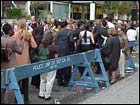|
U.S. jobless claims fall
|
 |
November 21, 2001: 11:34 a.m. ET
Both initial and continuing claims fell last week; confidence index gains.
|
NEW YORK (CNN/Money) - New jobless claims and the number of people remaining unemployed fell in the United States last week, the government said Wednesday, while a closely watched index of consumer confidence reportedly rose in November.
The Labor Department said new jobless claims fell to 427,000 for the week ended Nov. 17 - a week shortened by the Veterans Day holiday - from a revised 444,000 a week earlier. Economists surveyed by Briefing.com expected 452,000 new claims.
"I thought the number would have gone up," Robert McIntosh, chief economist at Eaton Vance Management told CNNfn's Before Hours program. "We have to remember this was a shortened week [for] a holiday, and that can skew the numbers quite a bit sometimes."
But the four-week moving average, which smoothes out fluctuations in the weekly data, also fell, to 454,250 from a revised 475,250 the prior week.
Continued claims, the number of workers who have been claiming benefits for at least a week, fell to 3.7 million in the week ended Nov. 10, the latest data available, from a revised 3.8 million the prior week.
|  | |
 |
 |
 |
| |
 CNNfn's Lisa Leiter takes a closer look at jobless claims.
CNNfn's Lisa Leiter takes a closer look at jobless claims.
| |
 |
Separately, the University of Michigan's final consumer sentiment index for November rose to 83.9 from October's reading of 82.7, according to a Reuters report. The closely watched index is available only to paying subscribers. Economists expected the final number to be unchanged from the preliminary reading of 83.5.
"This is undeniably good news," said Lara Rhame, economist at Brown Brothers Harriman. "The crucial question going forward is going to be if the rise in confidence is reflected in more spending on the part of the consumer, or if it's simply a patriotic rally."
On Wall Street, stock prices fell in morning trading and Treasury bond prices extended their recent losses.
To keep consumers spending despite mounting job cuts and a rising unemployment rate, the Federal Reserve has cut short-term interest rates 10 times this year.
If the Fed keeps getting good news like Wednesday's jobless data, the central bankers may become convinced that their previous rate cuts are taking effect and that their campaign to ease monetary policy is nearly over. Fed policy makers next meet on Dec. 11.
"The Fed will be encouraged by this, and it dampens somewhat the probability of a Fed easing," said Michael Moran, chief economist at Daiwa Securities, "but I would still look for another move in December."
Moran pointed out that unemployment is typically a lagging indicator, meaning it will often continue to rise even as the economy improves. Many economists think it could rise to 6.0 percent and beyond in coming months.
"The situation has improved, but we're still not where we want to be," Moran said.
Rising unemployment, combined with what will likely be a somewhat blue Christmas for retailers, could paint a pessimistic picture of the economy that would dampen consumer confidence.
It's unclear how much consumers, whose purchases of goods and services fuel two-thirds of the U.S. economy, have recovered from the Sept. 11 attacks, which worsened the economy's recent slump. The latest closely watched report from the Conference Board showed consumer confidence sinking in October, though the University of Michigan's index reportedly rose in November.
According to the Reuters report, the University of Michigan's measure of how consumers feel about current economic conditions rose to 95.3, compared with October's final reading of 94.0. The index of consumers' future expectations also rose, to 76.6 from October's final 75.5, according to the report.
"Certainly this Christmas shopping season is going to make for a lot of very negative headlines," Brown Brothers Harriman's Rhame said. "The concern is that this [weakness] will be a self-reinforcing phenomenon, but the confidence numbers indicate that may not happen."
To further help consumer confidence, Congress eventually might agree on a stimulus package of its own, involving billions of dollars in tax cuts and spending. Weeks ago, the House of Representatives passed a bill - supported by President Bush - that critics think focuses too much on giving tax breaks to corporations, which might not spend the money right away.
Click here for more on the Fed and rates
The Bush administration and some economists have grown frustrated with the slow pace of Congress' discussion of a stimulus package, saying lawmakers might end up passing a bill too late to actually help the economy.
Gross domestic product, the broadest measure of the nation's economy, shrank at a 0.4 percent pace in the third quarter and many economists expect it to shrink again in the fourth quarter. The most common definition of a recession is two straight quarters of GDP contraction.
But most economists expect a recovery next year.
"The next couple of months will be absolutely crucial," Rhame said. "If we can get through this, we're going to have growth that will be consumer-led next year." 
|
|
|
|
|
|

|

